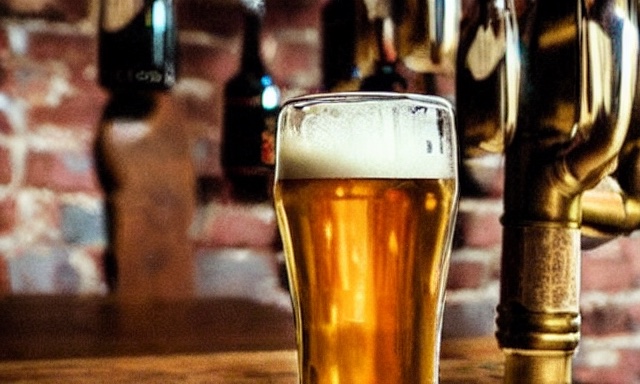Internet Asks: "How Much Sugar in Beer?"
Raise your mugs, beer aficionados, as we delve into the frothy world of brews and uncover the truth about everyone's favorite liquid gold – beer! While we toast to the craftsmanship of brewers, the flavors, and the camaraderie that comes with sipping a cold one, it's time to explore a question that's been bubbling under the foam: "How much sugar is in beer?" Get ready to quench your thirst for knowledge and enjoy a refreshing sip of information.
sponsored links

The Beer Odyssey Begins
Before we embark on our beer-venture, it's essential to understand the components of this beloved beverage. eer is a harmonious blend of water, malted barley (or other grains), hops, and yeast. During the brewing process, the yeast feasts on the sugars present in the malt, converting them into alcohol and carbon dioxide – the magical fermentation dance that gives beer its boozy and bubbly character.
Sugar and Sip: The Sweet Facts
While beer is primarily known for its alcoholic content, it does contain a certain amount of residual sugars. These sugars are leftovers from the malted grains used in the brewing process.>The sugar content in beer can vary widely depending on factors such as the type of beer, brewing techniques, and additional flavorings.
Typically, lighter beers like lagers and pilsners tend to have lower sugar content compared to darker and heavier beers like stouts and porters. This is because the darker malts used in darker beers have undergone more extensive roasting, which can break down and convert sugars more effectively during the brewing process.
sponsored links
Decoding Beer Nutrition Labels
When exploring the sugar content of beer, it's helpful to check the nutrition label if available. In some countries, alcoholic beverages, including beer, are required to display nutritional information on their packaging. Keep an eye out for the "Total Carbohydrates" section, which includes sugars, fiber, and other carbohydrates.
Filling Up the Glasses: A Quick Overview
Here's a rough estimate of the sugar content in various beer styles:
-
1. Light Beers (e.g., Light Lager, Blonde Ale)
These typically have lower sugar content,ranging from 1 to 5 grams per 12-ounce (355 ml) serving. -
2. Regular Beers (e.g., Lager, Pilsner, Pale Ale)
These may contain around 5 to 10 grams of sugar per 12-ounce serving. -
3. Craft Beers and Specialty Beers
The sugar content can vary widely depending on the style and added ingredients. It can range from 5 to 20 grams or more per serving. -
4. Dark Beers (e.g., Stout, Porter)
These tend to have slightly higher sugar content due to the use of darker malts. Expect around 10 to 15 grams of sugar per 12-ounce serving.
Nutrition in Your Brewski
While beer isn't known for being a nutritional powerhouse, it does contain some essential nutrients:
- - Calories: The caloric content of beer varies based on factors like alcohol content and serving size. Light beers generally have fewer calories.
- - Carbohydrates: Carbohydrates in beer primarily come from sugars and starches. These can range from around 3 to 15 grams per serving, depending on the beer style.
- - Proteins: Beer contains small amounts of protein, contributing to its overall nutritional composition.
- - Vitamins and Minerals: Beer contains trace amounts of B vitamins and minerals like potassium, magnesium, and phosphorus.
Remember, Drink Responsibly
As you savor the delightful complexities of your favorite brew, it's important to keep in mind that beer consumption, like all things in life, should be enjoyed in moderation. While some sugar content is a natural part of beer, excessive consumption of alcoholic beverages can lead to various health concerns. Always be mindful of your alcohol intake, stay hydrated, and know your personal limits.
So, whether you're raising a pint of hoppy IPA or enjoying the velvety richness of a stout, you now have a better understanding of the sugar content in your glass. As you explore the vast world of beers, remember to appreciate the craftsmanship that goes into each sip and the stories shared over a cold one. Cheers to both your curiosity and responsible enjoyment!
Disclaimer: The information provided in this article is for informational purposes only and should not be considered as medical or dietary advice. The sugar content in beer can vary widely based on factors such as brewing methods, ingredients, and serving sizes. It's important to consult with a healthcare professional or registered dietitian before making any significant changes to your diet, especially if you have specific health conditions or dietary restrictions. Additionally, always drink alcohol responsibly and be mindful of your own health goals and limits.
sponsored links
References
- 1. USDA. Alcoholic beverage, beer, regular, all. https://fdc.nal.usda.gov/fdc-app.html#/food-details/168746/nutrients
- 2. NZ Herald. Beer: The real reason it's making you fat. https://www.nzherald.co.nz/lifestyle/beer-the-real-reason-its-making-you-fat/ZXUCLEQDSLNTDTU7YEQOOF6WUU/
- 3. Unknown Brewing. Does Beer Have Sugar?. https://www.unknownbrewing.com/how-much-sugar-is-in-beer/
- 4. WebMD. Beer: Is It Good for You?. https://www.webmd.com/diet/beer-good-for-you
- 5. Medical News Today. How many carbs are in some popular beers?. https://www.medicalnewstoday.com/articles/carbs-in-popular-beers
People are also reading...
Does Bourbon Have Sugar?
How Much Sugar In Coke?
Does Rum Have Sugar?
Does Whiskey Have Sugar?
How Much Sugar is in Fireball?
How Much Sugar in a Sprite?
Does Kahlua Have Caffeine?
Calories In a Grilled Cheese?
6 oz Steak Calories?
Ready to level-up?
Create meal plans 10x faster, follow up with your clients through our mobile app, and never struggle with meal planning or recipe management again.